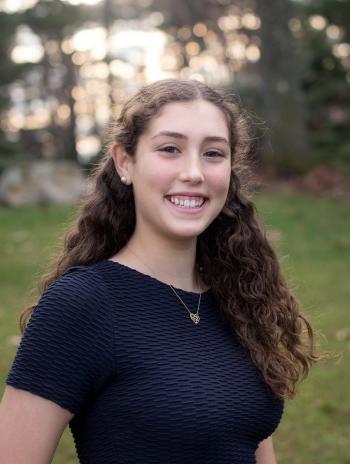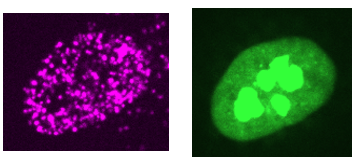
Name: Lilly Pfister
Class Year: 2025
Major: Biology and German
Hometown: Arlington, Mass.
Internship Organization: Harvard University
Location: Cambridge, Mass.
What's happening at your internship? We would love to hear what kind of work you are doing!
My internship is at Harvard University in Professor Dan Needleman’s lab under post-doctoral Bernardo Gouveia. Our project focuses on the cellular biology of nuclear bodies, which modulate chromatin organization and gene expression in the nuclei of eukaryotic cells. Chromatin is DNA bound by proteins, called histones, that, when joined together, form chromosomes.
My internship is investigating how nuclear bodies impact chromatin dynamics and the chromatin environment. Specifically, we are looking at the biophysical aspects of nuclear bodies through live cell microscopy imaging. I have been culturing human retina cells and imaging them to visualize nucleoli, a type of nuclear body that synthesizes ribosomes. Our final goal is to see how nuclear body and chromatin interactions impact transcription, or the process of making a copy of RNA from DNA.
Why did you apply for this internship?
As a biology major, I plan on pursuing a career in research after graduation, specifically in cellular and microbiology. The Needleman lab perfectly aligns with my interests as I am conducting experiments and analyzing data, which will be beneficial for my future career goals. This internship is providing me with hands-on experience in laboratory research, including PCR (polymerase chain reaction), lentiviral transfection, cell culture, and operating a spinning disc microscope. I have previously worked in the Needleman lab and loved my experience, making returning an easy decision to strengthen my connections and find new opportunities in a wet lab setting.
What has been your favorite part of this internship?
I have really enjoyed using a lentiviral vector to transfect my cultured cells during my internship. I first created a plasmid, a circular DNA molecule, that incorporated a specific DNA sequence into a vector using a PiggyBac transposon system, involving PCR and Gibson assembly. Then, I made a lentiviral vector (a retrovirus that incorporates into the genome of the host cell) to transfect my cells with the constructed plasmid, enabling gene integration and expression in my cells. This process takes a while due to incubation periods but it was a new experimental technique I learned which will be very useful for future projects.
Can you talk about the skills you are learning and why they are important to you?
I am learning how to use a spinning disc microscope to image my cells and subsequently analyze the data. I have been using ImageJ to enhance my images, quantify the data, and segment the cells. I have also been able to visualize chromatin movement away and towards nucleoli, which has helped us in our goal to better understand nuclear body and chromatin dynamics.
Through the Career and Civic Engagement Center Beyond Bryn Mawr Summer Internship Program, Bryn Mawr students pursue opportunities in fields such as nonprofits, government and law, health care, research, sciences, business, and the arts. Thanks to the generosity of our alumnae/i and donors, over 150 students across all academic departments are funded to pursue unpaid internships or research experiences in the U.S. and abroad each year.
